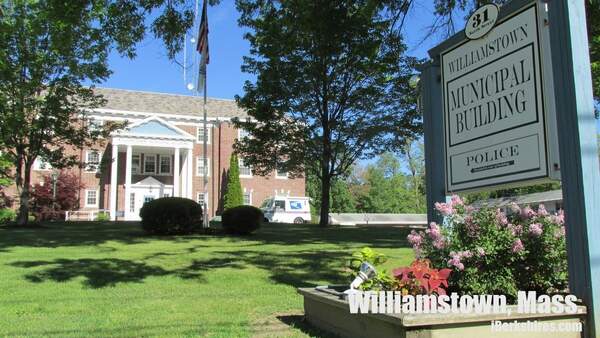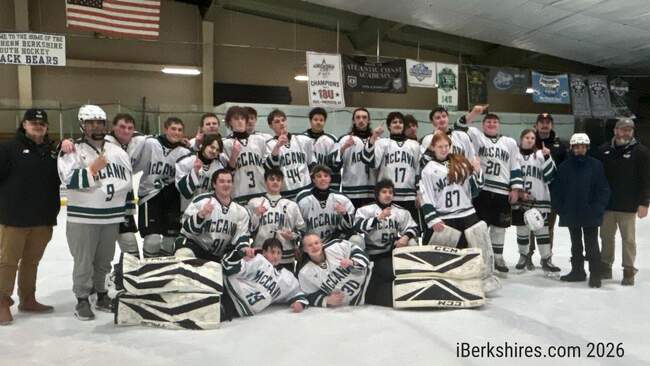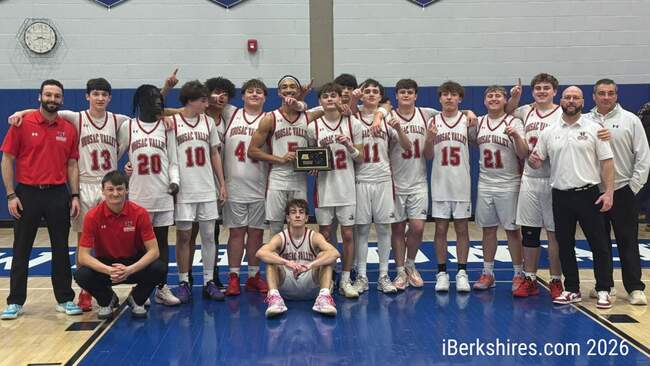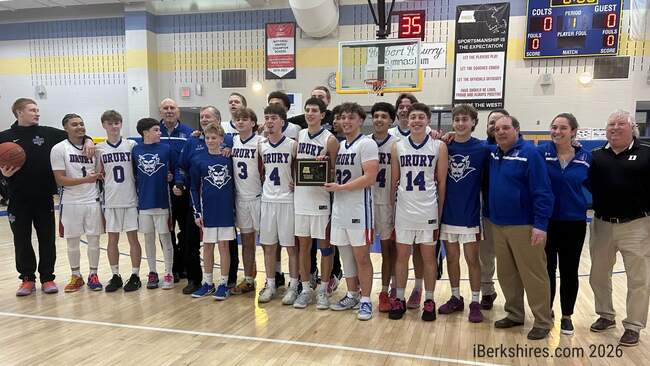Global Warming: A Hot Topic On A COOL Day
 |
| Center for International Environment and Resource Policy At Tufts Director William Moomaw [Photo by Sue Bush]View Slide Show |
The fluorescent tape stretched over the First Congregational Church lawn in a nearly straight line, and then curved sharply and steeply upward toward the church steeple. The sudden jump skyward represented the increase in emissions that began during the beginning of the 20th century.
The stunning illustration was part of a Step It Up day event initiated by environmental activist Bill McKibben. Step It Up events were held nation-wide and several Berkshire region communities hosted global warming/climate change events throughout the day.
<L2>Long tables served as information booths for numerous local organizations, including the town Carbon Dioxide Lowering [COOL]Committee, the Hoosic River Watershed Association, the Northeast Organic Farming Association, and the Center for Ecological Technology.
Start Pedaling
Members of a recently formed Mount Greylock Regional High School Youth Environmental Squad attended the rally. MGRHS student and global warming activist Rachel Payne was an event speaker. Squad members Isabel Kaufman and Sam Shuker-Hainer offered their thoughts about the issue and the event.
"There are things that everybody can do [to reduce emissions]," said Kaufman. "Right now, in terms of daily life, I really think that changing light bulbs [from incandescent bulbs to compact fluorescent bulbs] is the one thing that can easily be done."
Shuker-Hainer noted the crowd size and an absence of bicycles.
"I think the most important thing is not to use cars," he said. "Most of the people here could have ridden a bicycle. When you are just going around town, you can use a bicycle, or walk."
COOL committee member Wendy Penner said that she was delighted with the turnout. By noontime, about 130 people were gathered on the church campus.
"I'm just thrilled that this is happening," she said, as she worked to start a recording of Melissa Etheridge singing "I Need To Wake Up."
"We Need Policies Today"<R3>
Tufts University Center for International Environment and Resource Policy Director William Moomaw told the crowd that fossil fuel use and its' consequences are responsible for a host of problems, including an increased incidence of asthma in urban children and the inhumane, horrific situation in Darfur.
Moomaw is among the authors of a Union of Concerned Scientists and the Northeast Climate Impacts Assessment compiled study titled "Climate Change in the U.S. Northeast." He has been quoted as stating that if the Northeast were a nation, it would be the seventh-largest emitter of heat-trapping gasses in the world.
Today, Moomaw told the crowd that "I really like being able to work on the solutions."
"This is not about inventing some science fiction future," Moomaw said. "We need policies today."
Moomaw charged that U.S. power plants are operating less efficiently than those being built in China.
A Three Percent Challenge
The U.S. government is encouraging the nation's power producers to stick with 19th and 20th century strategies and technologies rather than support and reward the use of new, 21st century technologies and developing additional, fossil-fuel weaning strategies.
Change must occur at the federal, state, local, and personal level, Moomaw said. and noted that on the local level, municipal building inspectors could advise people about building "green."
Moomaw said he was "delighted" to learn about Brian Fairbank's plan to erect a wind turbine at Jiminy Peak and plans for construction of a biomass facility in Pittsfield.
The Step It Up goal is an 80 percent reduction in emissions by 2050; to meet that goal, individuals must reduce their household carbon dioxide emissions by three percent, Moomaw said.
What's Done Is Done
<L4>HooRWA Board of Directors Vice-president Lauren Stevens emphasized that the damage already done cannot be reversed. Speaking during an on-site interview, he said that people should be willing to do whatever is necessary to prevent further damage.
"This cannot be reversed," he said. "It can be reduced by taking action now."
Stevens noted the size and diversity of those at the rally.
"This is a big cross-section of people," he said. "I think it will raise awareness. I am particularly interested in the impact [of global warming] on the Hoosic River."
During his remarks, state Rep. Daniel E. Bosley D-North Adams said that individuals such as Moomaw "will lead us out of this."
My Town's Greener Than Your Town
State officials should lead by example, he added, and noted that there are many, many state-owned rooftops that should be hosting photovoltaic panels. Wind turbines should be up and running, Bosley said, although he cautioned that the turbines should not turn from all the mountaintops because the state's beautiful scenery is vital to the residents.
Bosley tossed out the idea that municipalities should be challenging each other to see which community can be the most energy efficient.
Volatile Weather Likely
Several speakers commented on the damp, raw, unseasonably cold chill of the mid-April day. Williams College student Justin Bates, who was a scheduled speaker, said during an interview that initially, global warming is likely to produce weather anomalies that may not always result in heat.<R5>
"Global warming can make things very volatile," Bates said. "It's safe to say that the weather will be very unpredictable."
Williamstown Proactive With Emission Reduction Strategies
Town Selectwoman and COOL committee member Jane Allen reminded the crowd of town actions taken to reduce carbon dioxide emissions.
The town's elementary school is designated as a "green building" and students are involved in recycling efforts, she said. Residents who own certain fuel efficient or hybrid vehicles are eligible for excise rebates, and the David and Joyce Milne Public Library hosts photovoltaic panels.
The town's emissions reduction efforts were given tremendous support by Williams College and college president Morton Schapiro earlier this year, when Schapiro announced that the college is striving to cut its carbon dioxide emissions by 10 percent by 2020.
State Sen. Benjamin B. Downing, Williams College Chaplain Rev. Richard Spalding, Rabbi Jeffrey Goldwasser of Congregation Beth Israel in North Adams and Fairbank, who is the CEO of Jiminy Peak, were among the event speakers.
All Life On Earth
First Congregational Church Rev. Carrie Bail welcomed those in attendance.
Global warming is a community issue, a human rights issue, and a justice issue, she said.
"This will impact all life on Earth," Bail said. "This requires immediate attention because it is the right thing to do."















